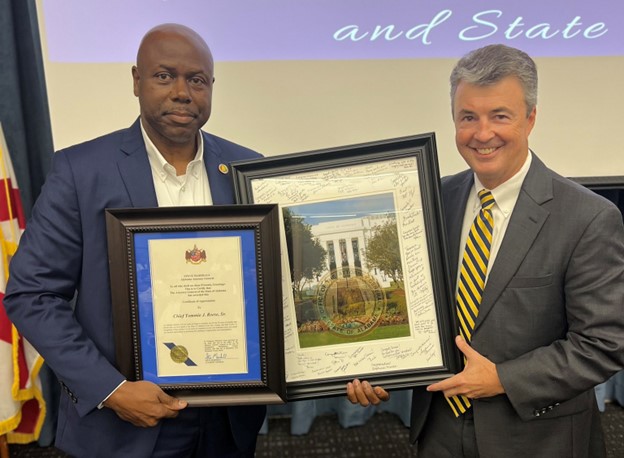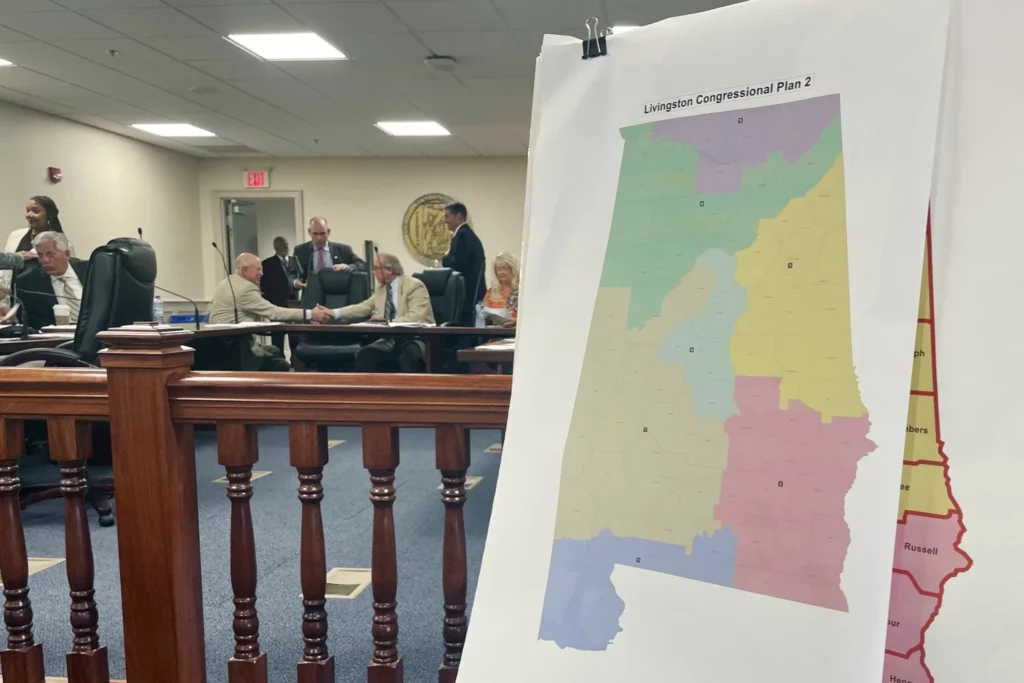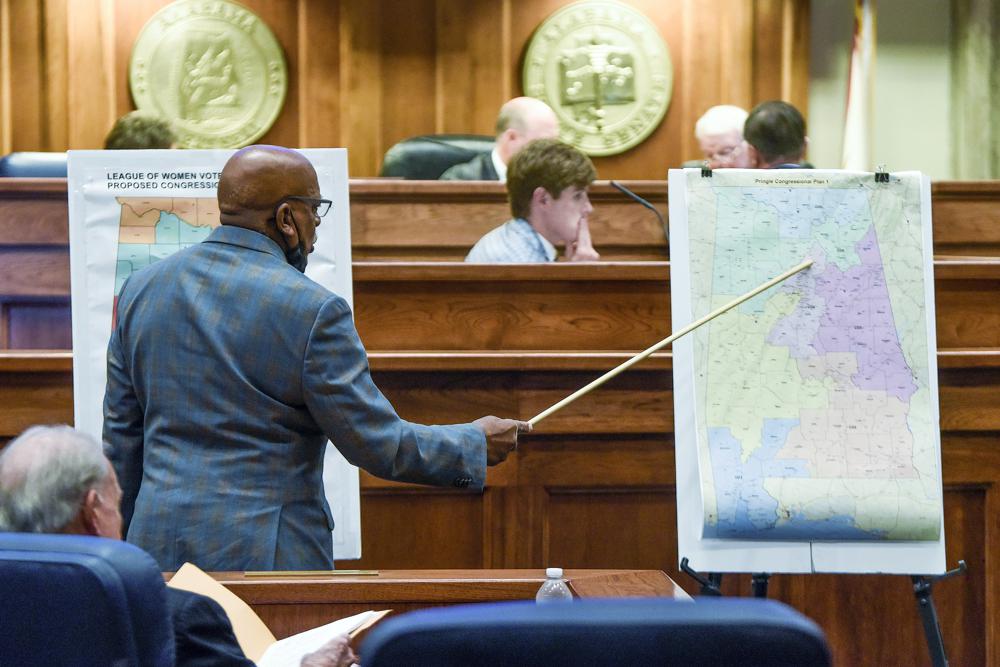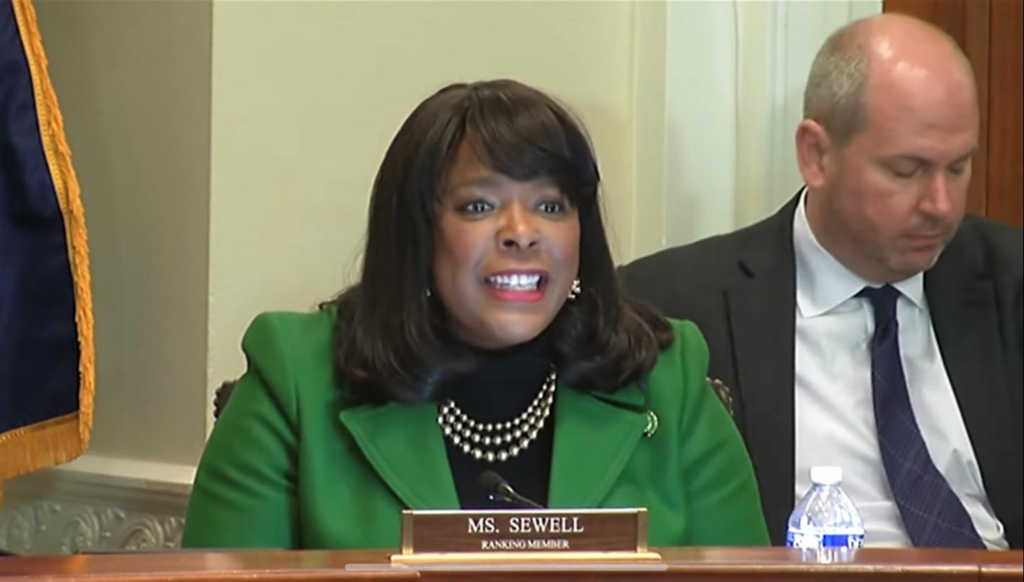AG Steve Marshall announces Jackie Hornsby to serve as office’s Law Enforcement Coordinator after retirement of Tommie Reese

On Monday, Attorney General Steve Marshall announced that long-time law enforcement professional Jackie Hornsby has been appointed as the new Law Enforcement Coordinator for the Alabama Attorney General’s Office. Hornsby will take over the role from Chief Tommie Reese, who will be retiring at the end of the month. Reese has served in the position since January 2019. “Special Agent Hornsby has proven himself to be a knowledgeable and dedicated law enforcement officer over his more than 26 years of service. Jackie’s wealth of knowledge will be a tremendous asset to our office and will contribute immensely to our relationships with other law enforcement agencies,” Marshall said in a press release. “With his understanding of our office’s resources and expertise, Special Agent Hornsby will be a great asset for local and state law enforcement who are facing a variety of new challenges in their communities.” Hornsby will work with law enforcement agencies across the state to develop training programs, notify officers of changes in criminal law, and facilitate communication and cooperation between the Attorney General’s Office and law enforcement statewide. “I have worked closely with General Marshall for many years, and I know and respect his genuine support for law enforcement,” said Special Agent Hornsby. “I am truly honored by the opportunity to continue serving the citizens of Alabama and the men and women of law enforcement as his Law Enforcement Coordinator.” Hornsby is a Pike County native who graduated from Troy University with a Bachelor of Science in Criminal Justice. He began his law enforcement career in 1997 with the Alabama Department of Public Safety as an Alabama State Trooper. After the creation of the Alabama Law Enforcement Agency (ALEA), Hornsby became a Special Agent Senior with the State Bureau of Investigation and later transferred to the Dignitary Protection Unit of ALEA. He has served on the security details of then Lt. Gov. Kay Ivey and Attorney General Luther Strange. Hornsby served on Attorney General Marshall’s security detail since he came into office in 2017 and became Detail Leader in 2019. Marshall commended Reese on his service. “Alabama is a safer state because of the relationships Chief Reese has forged in his 38 years of public service. Thank you, Chief, for your dedication to our men and women in blue. We wish you all the best in retirement,” Marshall said. Thank you, Chief Tommie Reese for your 38 years of service to our great state. It has been an honor and a privilege to have you serve as our law enforcement coordinator for the past five years. You will be missed dearly! pic.twitter.com/4qt6Evwdan — Attorney General Steve Marshall (@AGSteveMarshall) September 25, 2023
Special master deadline to finish redistricting maps is today

Monday is the court’s deadline for the special master to complete his work on redrawing Alabama’s Congressional districts. On Friday, the Associated Press reported that the U.S. Supreme Court is expected to soon rule on Alabama’s emergency appeal to keep the partisan congressional district lines drawn by the Alabama Legislature in a July special session in place. The three-judge panel has ordered the state to draw a new congressional district map with a second majority-Black district, or something close to it. The legislature submitted a map that increased the percentage of Black voters in Alabama’s Second Congressional District from 30 percent Black voters to 39.9 percent. The three-judge panel ruled that that map still violates the Voting Rights Act of 1965. State Representative Jim Hill (R-Odenville) told the St. Clair County Republican Party on Thursday the three-judge panel ordered the state to submit a plan with two majority-minority or very close to it. “The Legislature passed a map with a 40% Black district. The three-judge panel absolutely did not accept that,” Hill said. Hill said that this case, and its implications in other states has national repercussions on control of the U.S. House of Representatives. “The Republicans hold a (House) majority right at this moment, but it is very narrow,” Hill said. “It very easily could swing the majority of Congress back to the Democrats.” Attorney General Steve Marshall (R-Alabama) asked the three-judge panel to stay their redrawing of the congressional district maps while the state appeals to the Supreme Court. The three-judge panel refused, ruling that it was unlikely that the Supreme Court would find in the state’s favor. Marshall and the state’s attorneys are now asking the Supreme Court to put the redistricting on hold. Attorneys for the civil rights groups that challenged the state’s 2021 congressional redistricting are asking the court to reject the state’s request that they pause the court-ordered redrawing of the district maps. The plaintiffs in the case said that the state of Alabama “knowingly and intentionally” defied the three-judge panel’s orders and passed a map that continued to dilute the influence of Black voters in congressional elections. As it stands today, what maps the state will use for next year’s congressional elections are up in the air until the Supreme Court rules on Marshall’s request for a pause. “We are now in a waiting game,” explained Rep. Hill, who is a retired circuit judge. If the court does not order a pause in the process, then the three-judge panel is expected to consider the special master’s options in an October 3 hearing. If the Supreme Court orders a pause in the process, then the 2024 election could proceed with the map prepared by the Legislature in July, even if the court ultimately finds against the state. The major party primaries are on March 5, with candidate qualifying beginning on October 16. To connect with the author of this story or to comment, email brandonmreporter@gmail.com.
Tuscaloosa federal building renamed in honor of Richard Shelby

On Friday, former U.S. Senator Richard Shelby (R-Alabama) was back home in Tuscaloosa, where the courthouse and federal building were renamed in his honor. Judge L. Scott Coogler said that Shelby “has touched each and every one of our lives.” Alabama Governor Kay Ivey said, “I am proud to join this historic occasion to pay tribute to Richard Shelby.” Ivey applauded the naming of the Courthouse in Shelby’s honor. “What an appropriate way to honor Richard Shelby,” Ivey said. “He laid the groundwork for our state’s economic development.” “In March, the Alabama Legislature held a joint session to honor Richard Shelby,” Ivey continued. “Thank you to Richard Shelby for his dedicated service to the State of Alabama.” Alabama Attorney General Steve Marshall said, “It is a privilege to be here today to celebrate the life of this man.” Marshall applauded the many projects that Shelby brought to the state, “What has truly been achieved far exceeds any dollar amount.” “Senator, thank you for your service, and may God bless you,” Marshall said. Federal judge and former Alabama Attorney General Bill Pryor said, “In 2009, I was here to celebrate the groundbreaking of this Courthouse. I thank Senator Shelby for his leadership for making this building possible. He could not be here then because he was in Washington attending to the nation’s business.” “If there is anything more important than securing the peace and prosperity of the nation, it is the rule of law,” stated Pryor. Pryor said that a federal courthouse secures the rights of the people every day. “Senator Shelby has recommended the names of many talented lawyers who have served and continue to serve as federal judges,” said Pryor. The judges applauded Shelby for “his lifelong commitment to defending the Constitution of the United States.” “Thank you for being a friend to the courts of the federal judiciary,” Pryor said. U.S. Senator Katie Britt (R-Alabama) said, “I have the best job of the day. I get to introduce Senator Shelby. It is truly an honor to introduce such a legendary Alabamian.” Britt thanked Senator Shelby “for his vision and his determination.” Katie Britt was an intern for Shelby, who later joined his staff, rising to the level of Chief of Staff. She returned to public life in 2022, winning Shelby’s open seat after he retired. “At a time when so many people wanted to serve in order to generate a headline, you genuinely wanted to serve,” Britt said. Sen. Shelby thanked the Governor, Britt, and everyone else for attending Friday’s event. “Thank you all very, very much for this great honor,” Shelby said Shelby’s grandchildren then unveiled a portrait of the Senator that will hang in the Courthouse. Shelby represented Alabama in the U.S. Senate from 1987 to 2022. He represented Alabama’s Seventh Congressional District from 1979 to 1986. He represented Tuscaloosa in the Alabama Senate from 1970 to 1978. Before becoming an elected official, Shelby worked as an assistant Alabama Attorney General and prosecutor for the City of Tuscaloosa. To connect with the author of this story or to comment, email brandonmreporter@gmail.com
Federal court rejects Alabama’s request for a pause on congressional map ruling

On Monday, the State of Alabama suffered another major setback in its ongoing congressional redistricting map saga when the federal three-judge panel that is hearing Alabama’s congressional redistricting case denied the state’s request that the ruling be paused to give the state time to appeal to the U.S. Supreme Court – again. The federal three-judge panel wrote in their ruling on Monday, “It is exceptionally unusual for a litigant who has presented his arguments to the Supreme Court once already — and lost — to assert that he is now ‘overwhelmingly likely’ to prevail on those same arguments in that Court in this case.” The three-judge panel ruled that the state likely violated the Voting Rights Act of 1965 when it passed a congressional redistricting plan in 2021 that created six majority-white and just one majority-Black Congressional District. The court ordered the state to suspend the 2022 congressional elections and submit a compliant map. The state refused and instead appealed to the Supreme Court. The high court upheld the three-judge panel’s order allowing the 2022 election to proceed with the 2021 maps. In June, the Supreme Court ruled in Allen v. Milligan that the three-judge panel was right in their 2022 preliminary ruling and remanded the case back to them in a controversial 5 to 4 ruling against the state of Alabama. After the state’s rebuke by the Supreme Court, the three-judge panel ordered the state to prepare a map with two majority-minority districts “or something close to it.” The Alabama State Legislature met in a July special session. Instead of complying with the court order, the Republican-dominated Legislature passed a new map that increased the Second Congressional District from 30% Black voting age population to 39.9%. The Republicans in the Senate claimed that their ‘Livingston 3’ map kept communities of interest together and was as compact as possible. They argued that this was as close to fulfilling the court’s order. Never mind that the Republican-dominated House of Representatives had passed a map by Representative Chris Pringle (R-Mobile) with a 43.3% Black 2nd District. When the Pringle plan arrived in the Senate, State Senator Steve Livingston (R-Scottsboro) simply substituted it for his Livingston 3 map. The state adopted the Livingston 3 map. Livingston and Pringle are the joint co-chairs of the Legislature’s Joint Committee on Reapportionment. The Legislature’s Democrats and the civil rights groups suing the state asked the three-judge panel to reject the partisan Livingston 3 map. The three-judge panel complied, ruling that it (like the 2021 redistricting map) violated the Voting Rights Act. The court has appointed a special master to draw Alabama’s new congressional districts map. Alabama Secretary of State Wes Allen (R), on the advice of Attorney General Steve Marshall (R), appealed that ruling to the U.S. Supreme Court. Monday’s setback by the three-judge panel means that the court-appointed special master will continue redrawing the state’s seven congressional districts to create that second majority Black District. That map, which nobody has seen yet, will likely be the map the state will use to vote next year. The special master is supposed to be finished with his new map by September 25. The state is still asking the Supreme Court to intervene, but there is no guarantee that the Court will even hear this case. If it does agree to listen to the case, it is unknown if the Justices will allow the 2024 election to proceed with the Legislature’s Livingston 3 map or if they will allow the election to proceed with the new special master map. Democrats hope to use the Allen v. Milligan ruling to force states to create new majority-minority districts. The major party primaries are on March 5. The Alabama Democratic Party told Alabama Today Monday that candidate qualifying for Democrats will open on September 29. The Alabama Republican Party announced during the day that GOP candidate qualifying will not begin until October 16. Both parties are closing qualifying on November 10. To connect with the author of this story or to comment, email brandonmreporter@gmail.com.
Legal fights over voting districts could play role in control of Congress for 2024

Democrats got a potential boost for the 2024 congressional elections as courts in Alabama and Florida ruled recently that Republican-led legislatures had unfairly diluted the voting power of Black residents. But those cases are just two of about a dozen that could carry big consequences as Republicans campaign to hold onto their slim majority in the U.S. House of Representatives. Another trial alleging racial violations in voting districts got underway Tuesday in Georgia, where Democrats also hope to make gains while voting rights advocates in Ohio decided to drop a legal challenge to that state’s congressional districts — providing a bit of good news for Republicans. Legal challenges to congressional districts also are ongoing in Arkansas, Kentucky, Louisiana, New Mexico, South Carolina, Tennessee, Texas, and Utah. And new districts seem likely in New York and North Carolina, based on previous court actions. Though much remains to be settled, there’s a good chance congressional districts will be changing in numerous states. It’s likely that “a significant number of voters will be voting for a different person than they voted for in 2022,” said Doug Spencer, an election law professor at the University of Colorado who manages the All About Redistricting website. Republicans currently hold a 222-212 majority in the U.S. House, with one vacancy in a previously Democratic-held seat. Boundaries for the nation’s House districts were redrawn in all states before the 2022 election to account for population changes noted in the 2020 census. In some states, majority party lawmakers in charge of redistricting manipulated lines to give an edge to their party’s candidates — a tactic known as gerrymandering. That triggered lawsuits, which can take years to resolve. The court battle in Alabama, for example, already has lasted about two years since the legislature approved U.S. House districts that resulted in six Republicans and just one Democrat, who is Black, winning election in 2022. In June, the U.S. Supreme Court upheld a lower court’s finding that the map likely violated the federal Voting Rights Act by failing to provide Black residents — who comprise 27% of the state’s population — an opportunity to elect their preferred candidates in two districts. Alabama lawmakers responded in July by passing a revised map that maintained only one majority-Black district but boosted the percentage of Black voters in a second district from about 30% to almost 40%. A federal judicial panel on Tuesday decided that wasn’t good enough. But Republican Attorney General Steve Marshall’s office said it will again ask the U.S. Supreme Court to review that decision. Ongoing lawsuits in Georgia and Louisiana are using similar arguments to push for additional districts where Black voters could have more power. Democrats stand to gain because a majority of Black residents tend to vote for Democrats instead of Republicans. A Florida redistricting case decided Saturday by a state judge also involved race, though it relied on provisions in the state constitution instead of the Voting Rights Act. That judge said the U.S. House map enacted by GOP Gov. Ron DeSantis diminished Black voters’ ability to elect their candidate of choice in northern Florida. The judge directed Florida lawmakers to draw a new congressional map — a ruling that is likely to be appealed before it’s carried out. The litigation in southern states is “more of a racial representation issue than it is a political representation issue,” said Michael McDonald, a political science professor at the University of Florida who specializes in elections and redistricting. “But we can’t escape the political consequences, because we have a very closely balanced House of Representatives at the moment.” Though Democrats stand to gain from court challenges in Alabama, Florida, Georgia, and Louisiana, Republicans appear poised to pick up seats in North Carolina, which also has experienced a series of legal twists. North Carolina currently is represented in Congress by seven Democrats and seven Republicans after the state Supreme Court — under a Democratic majority — struck down the Republican legislature’s map as an illegal partisan gerrymander and instead allowed a court-drawn map to be used in the 2022 election. While that case was on appeal to the U.S. Supreme Court, voters elected a Republican majority to the North Carolina Supreme Court. Those judges in April reversed the previous ruling and declared there was no constitutional prohibition on partisan gerrymandering. The state’s GOP-led legislature is expected to pass new districts that favor their candidates before the 2024 election. A similar reversal could benefit Democrats in New York, where a state appeals court in July ordered an independent redistricting commission to start work on a new set of U.S. House districts that could be used in the 2024 election. The New York Commission had failed to reach a consensus before the 2022 election, leading to maps drawn by the Democratic-led legislature that were struck down as an unconstitutional gerrymander and replaced with court-approved maps. Republicans fared better under those maps, picking up several suburban New York City seats that could be put back into play if the districts are redrawn again. Political observers also had been keeping an eye on Ohio, where the state Supreme Court previously ruled that Republican-drawn maps were unconstitutional. Despite that, those districts were allowed to be used in the 2022 election, and Republicans won 10 of the state’s 15 U.S. House seats. The U.S. Supreme Court in June ordered the state court to take another look at the case. But voting rights groups on Tuesday told the state court that they are willing to accept the current districts in order to avoid “the continued turmoil brought about by cycles of redrawn maps and ensuing litigation.” Though lawsuits have become common after each decennial redistricting, they can lead to confusion among voters if congressional districts get changed after only a few years. “It does undermine a little bit the theory of representative democracy if you don’t even know who represents you election to election,” Spencer said. “It’s another reason why these redistricting games are so problematic.” Republished with the permission of The Associated Press.
Alabama will challenge decision in redistricting case

Alabama Attorney General Steve Marshall’s office announced in a statement late on Tuesday that the state will appeal Tuesday’s ruling by the federal three-judge panel rejecting the Alabama Legislature’s latest congressional redistricting map. Marshall’s office said, “While we are disappointed in (Tuesday’s) decision, we strongly believe that the legislature’s map complies with the Voting Rights Act and the recent decision of the U.S. Supreme Court.’ In filed papers with the Court, Alabama Secretary of State Wes Allen disclosed an intent to appeal the three-judge panel decision. The Legislature passed a new congressional redistricting map in a July special session. In June, the state was ordered to create a map with two majority-minority districts or something close to it by the three-judge panel. The Republican supermajority of the Alabama Legislature ignored the instructions of the court order and instead just increased the percentage of Black Voters in Alabama’s Second Congressional District from 30% to 39.9% and called it an “opportunity district.” The three-judge panel wrote that that partisan new map still violates the Voting Rights Act of 1965 and ordered a court-appointed special master to draw Alabama’s new congressional district lines. “We are deeply troubled that the state enacted a map that the state readily admits does not provide the remedy we said federal law requires,” the Judges wrote in their order on Tuesday. The state disagrees and will appeal to the Eleventh Circuit Court of Appeals and the U.S. Supreme Court. Legislators close to the redistricting told Alabama Today that appealing this case to the Supreme Court was always the plan and that they expected the three-judge panel would find against the state’s map. Marshall himself, in recent remarks to the Alabama Republican Party Executive Committee in Montgomery, expressed skepticism that the three-judge panel would find in favor of the state but that the state would appeal. The same three-judge panel ruled in 2022 that Alabama’s 2021 congressional redistricting map also violated the Voting Rights Act and ordered the state Legislature to draw a new map. Instead, the state defied the Court by refusing to draw a new map. The state appealed then to the U.S. Supreme Court. The Supreme Court initially stayed the three-judge panel order of a new map and allowed the 2022 congressional elections to proceed under the 2021 map. The Supreme Court, however, eventually ruled in June in favor of the civil rights groups suing the state and upheld the three-judge panel’s 2022 preliminary ruling that the state had likely violated the Voting Rights Act. The Supreme ruled 5 to 4 that the 2021 congressional redistricting map likely does violate the Voting Rights Act and referred the case back to the three-judge panel. The majority decision was written by Chief Justice John Roberts and supported by the three liberal justices. Brett Kavanaugh was the deciding vote. The state is staking its case on Kavanaugh reversing himself and instead finding in favor of the State of Alabama when the state makes its case before the Court for a second time. The Supreme Court is under no obligation to even hear this case. Also at issue is whether the 2024 congressional elections will use the July map drawn by the Legislature or the new map that the three-judge panel ordered on Tuesday for a special master to draw. The special master won’t be finished with that new map until September 25. The state has said it needs to have a map in place by October 1, as major party qualifying for the election will begin next month. If the Court agrees to hear the state’s appeal, it will take months for the legal process, and the major party primaries are set for March 5. At this point, no one in the State of Alabama knows with any certainty which congressional district they live in moving forward. The state contends it cannot draw a map with two majority-minority districts that is suitably compact and doesn’t divide communities of interest. The state has argued that dividing Mobile County or putting Mobile and Baldwin Counties (the two Alabama Gulf Coast counties) in separate congressional districts is unreasonable. They also say that the Wiregrass region of southeast Alabama should not be divided. The civil rights groups suing the state argue that these concerns are secondary to the Voting Rights Act. They demand that communities of color be allowed to pick their own congressional representation. To connect with the author of this story or to comment, email brandonmreporter@gmail.com.
Rep. Terri Sewell says redistricting decision is another victory for Black voters

On Tuesday, the federal three-judge Eleventh Circuit Court of Appeals judges panel released a 196-page ruling tossing out Alabama’s partisan congressional redistricting map passed along partisan lines in a July special session of the Alabama Legislature. Congresswoman Terri Sewell (D-AL07), who represents Alabama’s only majority-minority congressional district, released a statement following the federal court decision striking down the Alabama State Legislature’s 2023 Congressional Map and Appointing a Special Master to draw Alabama’s congressional districts. “Today’s decision is yet another victory for Black voters in Alabama and for the promise of fair representation,” Rep. Sewell said. “By appointing a special master to fairly redraw Alabama’s congressional map, the court has rejected the state legislature’s latest attempt to dilute the voices and voting power of African Americans all across our state.” “While we were outraged by the Alabama State Legislature’s open defiance of the Supreme Court’s original order to create two majority-minority districts, I am nonetheless grateful that a federal court has now intervened to protect the voices of Alabama’s Black voters,” Sewell concluded. “The Voting Rights Act of 1965 is indeed alive and enforceable!” The ruling means that a special master will draw up new congressional redistricting maps after both the 2021 and 2023 maps prepared by the Republican-dominated Alabama State Legislature have been set aside by the three-judge panel. Most legal observers expect that the state of Alabama will appeal this ruling. As of press time, there has been no comment from Alabama Attorney General Steve Marshall’s office. The Alabama Republican Party expressed their disappointment in the decision in a statement. “While we respect the Court, we are disappointed in its decision, and we trust that the State will ultimately prevail in this litigation,” the ALGOP said. The Special Master is expected to draw the state’s new Congressional Districts maps by September 25. Major party qualifying for the 2024 election begins in October. Congress members do not have to live in the district in which they run, but they are required to live in the state. The major party primaries will be held on March 5. Alabama is currently represented in the U.S. House of Representatives by six Republican White men and one Democratic Black woman – Sewell. The special master does not have to worry about the compactness of the districts, keeping communities of interest together, or avoiding placing two or more congressional incumbents in the same district. The state could still contest the special master’s map. To connect with the author of this story or to comment, email brandonmreporter@gmail.com.
Federal appeals court rejects Alabama Congressional redistricting map

On Tuesday, a three-judge panel struck down the Alabama Legislature’s new congressional redistricting map. The Court is expected to appoint a special master to redraw Alabama’s congressional map because the state Legislature refused to draw a map compliant with the Court’s previous order to draw a map with two majority-minority districts. In June, the Court ordered the state to submit a map with two majority-minority districts or something close to that. Instead, Alabama Republicans simply drew a map increasing the percentage of Black voters in Republican Congressman Barry Moore’s Second Congressional District from 30% to 39.9%. “We are not aware of any other case in which a state legislature — faced with a federal court order declaring that its electoral plan unlawfully dilutes minority votes and requiring a plan that provides an additional opportunity district — responded with a plan that the state concedes does not provide that district,” the judges wrote in a 196-page ruling. The plaintiffs in the Milligan v Allen case that challenged the original 2021 redistricting as not compliant with the Voting Rights Act of 1965 rejected the second map. On Tuesday, the Court issued a ruling agreeing with the plaintiffs. None of this was unexpected. Alabama Attorney General Steve Marshall in August told the Alabama Republican Executive Committee meeting in Montgomery that he was skeptical of the three-judge panel ruling in favor of the state. The state lost a narrow 5 to 4 decision before the U.S. Supreme Court. The Court in June affirmed that the three-judge panel in Atlanta was correct in its initial 2022 decision to halt Alabama’s election under the 2021 redistricting. After the initial judgment, the three-judge panel’s decision to block the 2022 election, the Supreme Court ruled that the three-judge panel likely had been right that the 2021 redistricting was not compliant with the Voting Rights Act. The special master has been given until September 25 to redraw Alabama’s Congressional districts, creating a second majority-minority district. The state is expected to ask the Supreme Court to stay the three-judge panel ruling and hear this case as they did last year. The state will likely ask the Supreme Court to again stay the three-judge panel’s ruling to allow the 2024 elections to take place under the partisan 2022 redistricting. The plaintiffs suing the state will undoubtedly challenge any legal maneuvering by the state of Alabama. State Senators close to the redistricting decision explained to Alabama Today that the state is staking its hope on Supreme Court Justice Brett Kavanaugh switching sides and voting with the four conservative jurists: Samuel Alito, Amy Coney Barrett, Clarence Thomas, and Neil Gorsuch. All of this is dependent on the Supreme Court even considering the case. They are not obligated by law to take up the matter. Kavanaugh voted with Chief Justice John Roberts, who wrote the decision for the majority. The three-judge panel is comprised of one Clinton appointee, Circuit Judge Stanley Marcus, and two Trump appointees, District Judge Anna Manasco and District Judge Terry Moorer. Candidate qualifying with the two major political parties begins in October, so the state needs to know what the district boundaries will look like by October 1. If this decision is applied to other southern states, including Texas and Florida, Democrats could pick up as many as twelve new majority-minority districts, likely flipping control of the U.S. House of Representatives to the Democrats in the 2024 elections. To connect with the author of this story or to comment, email brandonmreporter@gmail.com.
AG Steve Marshall says the state can prosecute those who help women travel for abortions

Alabama’s attorney general argued in a court filing that the state has the authority to bring conspiracy charges against groups who help women travel to another state for an abortion. Alabama Attorney General Steve Marshall’s office made the assertion in a Monday motion to dismiss a lawsuit brought by an abortion assistance fund and others arguing such prosecutions would be unconstitutional. The groups are seeking a legal ruling clarifying that Alabama can’t prosecute people for providing financial, appointment, or travel assistance for an Alabama woman to obtain an abortion in another state. Alabama bans abortion at any stage of pregnancy. Marshall argued while it’s legal for a woman to travel out of state for an abortion, he suggested groups that help her do so could face prosecution. “An elective abortion performed in Alabama would be a criminal offense; thus, a conspiracy formed in the State to have that same act performed outside the State is illegal,” the attorney general’s office wrote in the court filing. His office wrote that the Alabama Legislature categorized abortion as among the highest wrongs, “comparing it to murder” and “Alabama can criminalize Alabama-based conspiracies to commit abortions elsewhere.” Marshall has not prosecuted anyone for providing abortion assistance, but he has made statements saying that his office would “look at” groups that provide help. Those words have had a chilling effect on advocates, the groups said. The Yellowhammer Fund, a group that provided financial assistance to low-income abortion patients, stopped the work because of prosecution concerns. Lawyers for the plaintiffs argued Marshall is illegally trying to extend Alabama’s abortion ban outside its borders. A federal judge has scheduled a Sept. 5 hearing in the case. Republished with the permission of The Associated Press.
Alabama describes proposed nitrogen gas execution; seeks to become first state to carry it out

Alabama’s proposed procedures to carry out executions with nitrogen gas include fitting a mask over the inmate’s face and replacing their breathing air with nitrogen until their heart stops. The state described the procedures for the proposed new execution method in a redacted court filing. Alabama is seeking to become the first state to execute a prisoner using nitrogen. Nitrogen hypoxia has been authorized as an execution method in Alabama, Oklahoma, and Mississippi, but no state has used the method to carry out a death sentence. Nitrogen makes up 78% of the air inhaled by humans and is harmless when inhaled with proper levels of oxygen. Under the proposed execution method of nitrogen hypoxia, an inmate would be forced to breathe only nitrogen, depriving them of oxygen needed to maintain bodily functions and causing them to die. Alabama Attorney General Steve Marshall on Friday asked the Alabama Supreme Court to set an execution date for Kenneth Smith, 58, using nitrogen hypoxia as the method of execution. The attorney general’s office included a redacted copy of the protocol in a court filing asking a judge to dismiss a lawsuit filed by Smith. Smith, in seeking to block the state’s second attempt to execute him by lethal injection, had argued that nitrogen should be available. According to the protocol, the inmate would be escorted into the execution chamber, now used for lethal injections, placed on the gurney, and have a mask fitted over their face. The warden would then read the death warrant and give the inmate a chance to give a final statement up to two minutes long. Execution team members would then make a final inspection of the mask. The warden, from another room, would then “activate the nitrogen hypoxia system.” “After the nitrogen gas is introduced, it will be administered for 15 minutes or five minutes following a flatline indication on the EKG, whichever is longer,” the procedures stated. If Alabama carries out an execution by nitrogen, it will be the first new execution method since lethal injection was introduced in the 1970s. Deborah Denno, a death penalty expert at Fordham Law School, said that unlike lethal injection and electrocution, which have been used for decades, “experts could only speculate about how a state might conduct a nitrogen hypoxia execution.” She said the filed Alabama protocol does not provide answers because of its vagueness and heavy redactions. “This is a vague, sloppy, dangerous, and unjustifiably deficient protocol made all the more incomprehensible by heavy redaction in the most important places,” Denno wrote in an email. John Palombi, an attorney representing several death row inmates, said, “It will be difficult to fully analyze this protocol until a far less redacted version is made available.” “This is a complex procedure, and we have every right to be concerned when the Department of Corrections is not transparent about it, particularly when they have had such a bad track record recently,” Palombi wrote in an email. Alabama attempted to execute Smith by lethal injection last year, but called off the execution because of problems inserting an IV into his veins. It was the state’s second such instance within two months of being unable to put an inmate to death and its third since 2018. The day after Smith’s aborted execution, Gov. Kay Ivey announced a pause on executions to conduct an internal review of lethal injection procedures. The state resumed lethal injections last month. Alabama lawmakers approved nitrogen hypoxia as an alternate execution method in 2018 as death penalty states faced difficulty obtaining lethal injection drugs and ongoing litigation challenging the humaneness of lethal injection. “It’s readily available. It’s 78% of the air we breathe, and it will be a lot more humane to carry out a death sentence,” Trip Pittman, the former Alabama state senator who proposed the new execution method, said. Pittman said the inmate will pass out — similar to how aircraft passengers pass out when a plane depressurizes — and then die. Pittman disputed criticism that the method is experimental. He said that while no state has carried out a death sentence with nitrogen, people have died by breathing nitrogen during industrial accidents and suicide attempts, so the effects are known. Smith was one of two men convicted in the 1988 murder-for-hire slaying of Elizabeth Sennett. The other man convicted in the killing was executed in 2010. Charles Sennett, the victim’s husband and a Church of Christ pastor, killed himself when the investigation began to focus on him as a possible suspect, according to court documents. Republished with the permission of The Associated Press.
Drug trafficking is the most common federal crime in Alabama

According to data from the U.S. Sentencing Commission, the most sentenced federal crime in Alabama is drug trafficking. Alabama has 6.37 federal sentences per 100,000. Drug trafficking crimes involve knowingly manufacturing, dispensing, or distributing controlled substances or counterfeit controlled substances meant to be passed off as the real thing. This does not count all the drug trafficking cases handled by the state courts. Alabama Attorney General Steve Marshall explained, “Due to our state’s proximity to Atlanta, a major distribution point for drugs, and to Texas, a border state, Alabama has become a prime transit point for drug trafficking. “We see marijuana, cocaine, meth, and now illicit fentanyl coming into our state as a result. The drug trade brings dangerous and violent illegal aliens into Alabama.” Firearms offenses, ranked second, are sentenced at a rate of 5.81 federal sentences per 100,000. Firearms offenses are committed when a defendant illegally possesses or uses a firearm. Under federal law, if you have been sentenced to a felony or have been convicted of a domestic violence crime, you lose your gun rights. In most cases, law enforcement stopped the defendant for some other reason and found that they were illegally in possession of a gun. There is some concern on the part of law enforcement that Alabama’s permitless carry law will mean fewer felons with a gun will be detected moving forward. Crimes involving fraud, theft, or embezzlement are the third most sentenced category of federal crimes in Alabama, with a rate of 2.01 federal sentences per 100,000. Fraud is when any deception or misrepresentation is used to benefit someone. Theft is the unlawful taking of someone else’s property, while embezzlement is theft while in a position of trust over stolen funds or items. Again, this does not count all the fraud, theft, or embezzlement cases handled in state circuit court. Fourth is immigration law violations. Alabama has a rate of 0.51 federal sentences per 100,000. Immigration crime relates to the illegal entry of the United States by a foreign national or committing a felony offense as an immigrant to the United States. The fifth most common federal sentence in Alabama is robbery, with a rate of 0.41 federal sentences per 100,000. Robbery is when someone takes or attempts to take an item of value from another while using force, the threat of force, or making the victim fearful that force will be used against them. Robbery differs from theft because of the violence or threat of violence aspect of it. Most robbery cases would be handled by state courts, so the actual robbery rate is much higher than these statistics would show, as this deals only with the federal court system. A spokesperson for Criminal Defense commented on the study’s findings, “It is interesting to see which categories of crime receive the most federal sentences in each state, and it is even more fascinating to see some states having the highest rates in multiple categories. At a state level, it is vital that the right resources are utilized to discover how each state can be supported in improving how frequently they have to hand out these sentences.” Criminal Defense is defense lawyers specializing in providing legal defense in criminal cases exclusively through experienced attorneys, many of whom have previous experience in senior roles in the Department of Justice. Data on the number of federal sentences given in each state in the fiscal year 2022 (October 1st, 2021, to September 30th, 2022) was obtained from the United States Sentencing Commission. This data was used to find the rate per 100,000 each state was being sentenced for federal crimes in various categories. Alabama is divided into three districts in the federal court system. 441 defendants were sentenced in Alabama’s Northern District in 2021. 306 defendants were sentenced in Alabama’s Southern District in 2021. 164 defendants were sentenced in Alabama’s Middle District in 2021. By comparison, the District of Arizona sentenced 4,454 defendants in 2021. In Arizona, like the rest of the Southern border districts, immigration offenses are the most sentenced federal crime. To connect with the author of this story or to comment, email brandonmreporter@gmail.com.
Alabama wants to be the 1st state to execute a prisoner by making him breathe only nitrogen

Alabama is seeking to become the first state to execute a prisoner by making him breathe pure nitrogen. The Alabama attorney general’s office on Friday asked the state Supreme Court to set an execution date for death row inmate Kenneth Eugene Smith, 58. The court filing indicated Alabama plans to put him to death by nitrogen hypoxia, an execution method that is authorized in three states but has never been used. Nitrogen hypoxia is caused by forcing the inmate to breathe only nitrogen, depriving them of oxygen and causing them to die. Nitrogen makes up 78% of the air inhaled by humans and is harmless when inhaled with oxygen. While proponents of the new method have theorized it would be painless, opponents have likened it to human experimentation. Alabama authorized nitrogen hypoxia in 2018 amid a shortage of drugs used to carry out lethal injections, but the state has not attempted to use it until now to carry out a death sentence. Oklahoma and Mississippi have also authorized nitrogen hypoxia but have not used it. The disclosure that Alabama is ready to use nitrogen hypoxia is expected to set off a new round of legal battles over the constitutionality of the method. The Equal Justice Initiative, a legal advocacy group that has worked on death penalty issues, said Alabama has a history of “failed and flawed executions and execution attempts” and “experimenting with a never before used method is a terrible idea.” “No state in the country has executed a person using nitrogen hypoxia, and Alabama is in no position to experiment with a completely unproven and unused method for executing someone,” Angie Setzer, a senior attorney with the Equal Justice Initiative, said. Alabama attempted to execute Smith by lethal injection last year, but called off the execution because of problems inserting an IV into his veins. It was the state’s second such instance within two months of being unable to put an inmate to death and its third since 2018. The day after Smith’s aborted execution, Gov. Kay Ivey announced a pause on executions to conduct an internal review of lethal injection procedures. The state resumed lethal injections last month. Smith was one of two men convicted in the 1988 murder-for-hire slaying of a preacher’s wife. The Alabama attorney general argued it is time to carry out the death sentence. “It is a travesty that Kenneth Smith has been able to avoid his death sentence for nearly 35 years after being convicted of the heinous murder-for-hire slaying of an innocent woman, Elizabeth Sennett,” Attorney General Steve Marshall said Friday in a statement. Alabama has been working for several years to develop the nitrogen hypoxia execution method but has disclosed little about its plans. The attorney general’s court filing did not describe the details of how the execution would be carried out. Corrections Commissioner John Hamm told reporters last month that a protocol was nearly complete. A number of Alabama inmates seeking to block their executions by lethal injection, including Smith, have argued they should be allowed to die by nitrogen hypoxia. Robert Grass, an attorney representing Smith, declined to comment Friday. Sennett was found dead on March 18, 1988, in the home she shared with her husband on Coon Dog Cemetery Road in Alabama’s Colbert County. Prosecutors said Smith was one of two men who were each paid $1,000 to kill Sennett on behalf of her husband, who was deeply in debt and wanted to collect on insurance. The slaying, and the revelations over who was behind it, rocked the small north Alabama community. The other man convicted in the killing was executed in 2010. Charles Sennett, the victim’s husband and a Church of Christ pastor, killed himself when the investigation began to focus on him as a possible suspect, according to court documents. Republished with the permission of The Associated Press.


